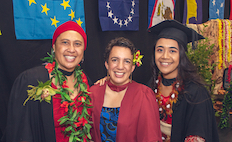 Research is an important tool in creating change. By placing Pacific voices and perspectives at the centre of research and acknowledging the strength and innovation that exist in communities research we can help shape our health systems to better meet the needs of Pacific Communities.
Research is an important tool in creating change. By placing Pacific voices and perspectives at the centre of research and acknowledging the strength and innovation that exist in communities research we can help shape our health systems to better meet the needs of Pacific Communities.
Meet our Va'a o Tautai Pacific Health Research Team
Pacific health research projects
Mental health and well-being of Pacific youth in higher education
Funding: Health Research Council of New Zealand
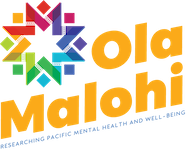 Lead: Faumuina Professor Fa'afetai Sopoaga
Lead: Faumuina Professor Fa'afetai Sopoaga
Research team: Dr Shyamala Nada-Raja, Dr Ari Samaranayaka, Tracie Leckie, Sellina Sa'u
There are at least 30,000 Pacific students in tertiary institutions. This research seeks to support and enhance the mental health and well-being of Pacific students in tertiary institutions. We are seeking to determine the protective and resiliency factors, as well as other factors which impact on the health and mental well-being of Pacific students. We will explore students access to services, their experiences and expectations including barriers to using health or other support services. Furthermore, we wish to determine the role of access to services on their mental health, well-being and academic progress.
Contact us
Email ola.malohi@otago.ac.nz
Web Ola Malohi Research Group
Exploring the needs of Pacific families affected by age-related cognitive impairment
Funding: Brain Research New Zealand – Rangahau Roro Aotearoa (BRNZ)
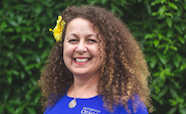 Dr Vanda Symon.
Dr Vanda Symon.
Leads: Dr Vanda Symon, Professor Pauline Norris, Associate Professor Rosalina Richards
Research team: Dr Nicola Kayes (AUT), Talai Mapusua, Professor Leigh Hale (Physiotherapy), Michael Lameta
Pacific populations in NZ are ageing, but little is known about Pacific people's experiences of or views about cognitive impairment. With the increasing population of older people, the number of Pacific people with dementia is predicted to increase. In 2016, 2.3 % of NZers with dementia were Pacific peoples, and by 2038 this projected to be 3.3%.
There is reason to suspect that the incidence of dementia may be higher in Pacific peoples, due to the presence of higher risk factors such as socioeconomic deprivation, educational level, diabetes, hypertension, obesity, stroke, smoking, alcohol intake, and head injury. There is some evidence that Pacific peoples are diagnosed with dementia at a younger age, and present at a more advanced stage of dementia.
The principal aims of our research would be to explore the needs of Pacific people and families affected by age-related cognitive impairment. This aim of this project is to find out what information and services are currently available and used by Pacific people and families affected by age-related cognitive impairment, and to explore unmet needs for information and services.
Email vanda.symon@otago.ac.nz
Health implications from education for Pasifika people and their families
Funding: Health Research Council of New Zealand Postdoctoral Fellowship
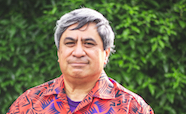 Dr Jesse Kokaua.
Dr Jesse Kokaua.
Lead: Dr Jesse Kokaua
Research team: Associate Professor Rosalina Richards, Research Professor Moana Theodore, Professor Richie Poulton
This study seeks to investigate to what extent health outcomes, particularly mental health outcomes, among Pasifika are related to education, and to tease out whether this is a direct or indirect association.
The first project will look at health outcomes of graduates from University study in New Zealand. The second will look at health outcomes for Pasifika families associated with education.
While studies have looked at the socio-economic or health benefits associated with education, few have looked at health in the context of the former. And none have been found that seek to view these from behind a Pasifika lens to investigate generational differences in health outcomes and their association with education.
Email jesse.kokaua@otago.ac.nz
Lighted Paths: Education and pathways to better health for Pacific families
Funding: HRC 2020 Sir Thomas Davis Te Patu Kite Rangi Ariki Health Research Fellowship
 Dr Jesse Kokaua.
Dr Jesse Kokaua.
Lead: Dr Jesse Kokaua
Research team: Associate Professor Rosalina Richards, Research Professor Moana Theodore, Professor Richie Poulton, Professor Philip Schulter, Dr Rick Audas
This project is leveraging off a previous investigation into associations between years of parental education at one point in time and comparatively high-level health conditions. This project will seek to use the longitudinal nature of the Integrated Data Infrastructure (IDI) to investigate further the associations between education on the health burden of Pacific families. Also, the pathway for a Pacific family to progress from one state at one point in time to another state ten years later. Thus, for example, how did Pacific families with generally good health outcomes today, look ten years ago. In particular, what contributed to families, considered to have fewer opportunities, to continue to comparatively successful health outcomes over time, and did education play a part in that progression.
Email jesse.kokaua@otago.ac.nz
Sleep and well-being among Pacific children and adolescents
Funders: Health Research Council Pacific Project Grant
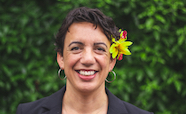 Associate Professor Rosalina Richards.
Associate Professor Rosalina Richards.
Lead: Associate Professor Rosalina Richards
Research team: Dr Molly George, Professor Rachael Taylor, Professor Ruth Fitzgerald, Professor Barbara Galland
Ensuring children and adolescents receive sufficient good-quality sleep is critical for their physical and emotional health. We currently know little about sleep in Pacific children and their families and how to best support good sleep / wake patterns within Pacific contexts. The overarching objective of this project is to inform the development of effective sleep interventions by capturing Pacific perspectives about sleep, health and interventions.
The first study will involve interviews with Pacific parents, exploring intergenerational changes in sleep patterns, associations between sleep and well-being and appropriateness of current sleep measurement and intervention strategies. A second study will use key informant interviews with Pacific health and educational professionals to explore the role of sleep in health / education outcomes for Pacific families and explore ways to maximise the effectiveness of sleep interventions for Pacific communities.
Email rose.richards@otago.ac.nz
Moemoeā: Sleep, health, communication, and wellbeing for pepi and the whanau
Funding: A Better Start National Science Challenge
 Associate Professor Rosalina Richards.
Associate Professor Rosalina Richards.
Co-Leads: Professor Rachael Taylor, Associate Professor Rosalina Richards, Justine Camp
Research team: Tania Cargo, Professor Barbara Galland, Dr Jill Haszard, Dr Lisa Daniels, Dr Barry Milne, Professor Barry Taylor, Professor Wayne Cutfield, Jacinta Faalili-Fidow, Dr Seini Taufa, Dudley Gentles, Amio Ikihele, Mary Roberts, Huhana Ramsey.
Moemoeā will explore Māori and Pacific expertise on nurture and connection before sleep, whānau responsiveness, communication and early oral language, and weave this with western evidence on effective ways of improving sleep in children to develop potential intervention approaches that are appropriate, engaging, useful and easy to use. These components will create a 'toolkit' that is tailored for Māori and Pasifika families, will support communication and connectedness between children and caregivers, and will incorporate relevant cultural values and traditions. Rather than simply rolling out the toolkit as is typically done, we will use a highly innovative approach called the Multiphase Optimization Strategy (MOST) that is able to determine which individual components are effective, which are not, and which might add value to other components (even if not effective by themselves). By using MOST, we will ensure that the final toolkit only includes components with proven efficacy - a more economical approach in this time of scarce healthcare resources. This Māori and Pacific led collaborative project allows communities to be a vital part of the development process and provides immense opportunities for workforce development, and for collaboration with agencies aiming to improve health and wellbeing in tamariki and their whānau.
Email rose.richards@otago.ac.nz
Tailoring academic support for postgraduate distance education students in the Cook Islands and Pacific region for the Otago School of Medicine
Funding: University of Otago Teaching Development Grant
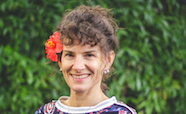 Associate Professor Katharina Blattner.
Associate Professor Katharina Blattner.
Researchers: Associate Professor Katharina Blattner, Associate Professor Rosalina Richards, Dr Kiki Maoate, Dr Allamanda Faatoese, Frances Brebner, Dr Mark Smith, Dr Rory Miller
The purpose of this project is to strengthen academic support for University of Otago postgraduate distance education students located across the Pacific Region.
Doctors based in the Cook Islands began studying at the University of Otago under a Memorandum of Understanding with the Cook Islands Ministry of Health in 2014. Their course of study is the Rural Postgraduate Programme (RPGP), Dunedin School of Medicine. The RPGP embraces the virtual campus concept with papers largely distance taught to a dispersed student body by a dispersed faculty.
Key facilitators of the programme for the Pacific Island Country-based students include distance learning, allowing local practitioners to stay in-country; linking to an established medical training programme; and clinical practice synergies. This project intends to investigate the Pacific Island Country-based student experience within the postgraduate rural programme and virtual campus, and identify effective and sustainable solutions to better support these students and the staff involved. We also aim to identify other opportunities to build and strengthen academic capacity in Pacific Island Countries where postgraduate students are currently based.
Email katharina.blattner@otago.ac.nz
Prevalence of chronic kidney disease in Samoan residents in New Zealand and Samoa
Funding: Health Research Council 2019 Pacific Clinical Research Training Fellowship
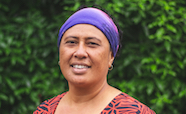 Dr Malama Tafuna'i.
Dr Malama Tafuna'i.
Lead: Dr Malama Tafuna'i
Researchers: Professor Rob Walker (DSM), Professor Diana Sarfati (UOW), Faumuina Professor Fa'afetai Sopoaga, Associate Professor Rosalina Richards
Chronic Kidney Disease (CKD) is recognised as a public health issue in New Zealand (NZ). Maori and Pacific people in NZ carry this burden with a 3-5 x greater risk of developing End Stage Kidney Disease and commencing subsequent Renal Replacement Therapy than NZ European. Pacific people have been found to be 2.62 times more likely to develop CKD unrelated to diabetic nephropathy. The prevalence of CKD in Samoan people has never been studied nor has the associated risk factors for its development been evaluated. This study proposes to compare and contrast the prevalence of CKD in Samoan people resident in New Zealand with Samoan people resident in Samoa. At the same time, it will look at the risk factors associated with CKD in Samoan people both in New Zealand and Samoa, to try and understand any relationships between these and the development and progression of CKD.
Email lama.tafunai@otago.ac.nz
Randomised controlled trial of the impact of removing prescription charges for people with low incomes and high health needs, on hospital bed-days
Funding: Health Research Council of New Zealand
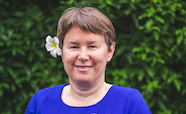 Professor Pauline Norris.
Professor Pauline Norris.
Lead: Professor Pauline Norris
Researchers: Dr Kim Cousins, Dr Simon Horsburgh, Dr Alesha Smith, Shirley Keown, Dr Ari Samaranayaka, Professor Carlo Marra, Dr Marianna Churchward, Shih Yen Chang
Although prescription charges in New Zealand are low compared with many other countries, many people report that they cannot a ord the medicines they need. We plan to conduct a randomised controlled trial of prescription charges to see whether removing charges would improve people's health.
Email pauline.norris@otago.ac.nz
Health services research
Funding: Division of Health Sciences Strategic Initiative
 Professor Pauline Norris.
Professor Pauline Norris.
Lead: Professor Pauline Norris
This project aims to enhance health services research in the Division of Health Sciences. This includes research on what kind of health services people want and need, and how to organise, fund and improve health services.
Email pauline.norris@otago.ac.nz